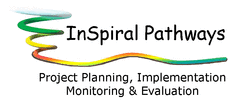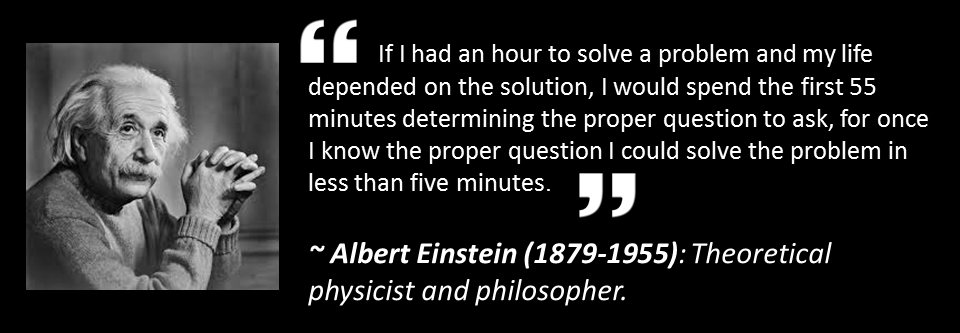What Albert Einstein and Jeremy Paxman taught me
Jeremy Paxman’s approach may have been effective in an adversarial arena where the objective is to expose half-truths but it was the bluntest of blunt instruments as a means of understanding the work I was doing. He lacked the empathy needed for situations where personal connection is more important than confrontation. Empowering questions – those that enhance connection and shared understanding, are the foundation of Appreciative Inquiry. Jeremy Paxman, no doubt, had many strengths but apparently, an appreciation of the value of the empowering question was not among them.
The power of the question
The terms empowering question and appreciative inquiry are practically synonyms. The importance of empowering questions is enshrined in one of AI’s Big Five” principles, the Simultaneity Principle which states that inquiry is an intervention, systems move in the direction of the questions we most persistently ask, and change happens from the moment we begin our inquiry. In other words questions are extremely powerful so we need to make them count.
Problematic questions
- How do we tackle the issue of violence in our inner cities?
- How do we eliminate sexual harassment in the workplace?
- How can we reduce high staff turnover?
But projects are essentially human systems, albeit involving mechanical processes to some extent. Simply stated, people don’t behave like cars. The problem-based approach, by emphasising what is going wrong discounts everything that is going right. Any good work that is being done may end up being devalued or simply ignored. This can easily be interpreted as personal criticism of those that have been doing this good work in the system under consideration. And on the whole people don’t respond too well to personal criticism.
A “bright spots” approach, casting a spotlight on what is successful and why, helps to engender positive feelings and steer us towards the things that work. This can motivate us to ‘step up the stairs’, knowing that we are already part way along our journey. In contrast, focusing primarily on problems can paralyse us into ‘staring up the steps’ from a baseline situation that implicitly discounts any progress made to date.
Turn that frown upside down - The Appreciative interview
- How do we ensure our inner cities are peaceful?
- How do we maintain a gender sensitive work environment?
- How do we maximise employee retention?
1. Identify a time while you have been working with your organisation when you felt most effective.
- Describe this experience. How did you feel?
- Who (inside and outside of your organisation) has helped and how to make this experience effective for you?
3. What do you appreciate most about your organisation? In what ways does it excel?
4. Do you have three wishes that could help your organisation to become even more effective?
As you will have no doubt have noticed, the “three wishes question” gives the interviewee scope to be critical as ‘wishes’ clearly relate to something that is currently not quite as you would like it. But it does so in a positive context. Paradoxically, the AI process can be a very effective way of identifying gaps that needed to be addressed as it facilitates honest disclosure in a non-judgemental environment.
Tips for asking empowering questions
Here are some tips for asking empowering questions I have extracted from these resources and my personal experience:
Questions are precious so use them wisely – Carefully plan your interview so that all your questions are asked with a clear purpose in mind to optimise the process. Establishing rapport is an important objective so you may need to spend some time on questions that appear unimportant to those with a western perspective on efficiency.
Ask about what you want more of not what you want less of – Phrase questions positively as outlined in the section above on affirmative questions.
Listen actively and without preconceptions so that you can capture the person’s perspective.
Make the process personal to yourself and others. It is easier to imagine something when you can see yourself or people close to you being involved. Ask for personal experiences – “How did you feel when that happened?” “What gave you the strength to deal with that situation?” “What qualities did you observe in your team when you reached that milestone?” In this way you drill down to uncover inspirational stories and people relate to other people through stories.
Use sensory language - Ask questions that activate the imagination using sensory language – daring to dream and “how would you feel if you achieved your goal?” and “what would success look like” questions help to turn up your senses in high definition.
Be friendly not inquisitorial – One of the purposes of the interview is empowerment. It is not the Spanish Inquisition. I learned from my Jeremy Paxman experience that a wrathful question generates more heat than light.
References
Diana Whitney, Amanda Trosten-Bloom, Jay Cherney and Ron Fry (2004). Appreciative Team Building: Positive Questions to Bring Out the Best of Your Team. iUniverse, Inc. New York, Lincoln, Shanghai.
Tony Stoltzfus (2008). Coaching Questions: A Coach's Guide to Powerful Asking Skills. Pegasus Creative Arts.



 RSS Feed
RSS Feed
